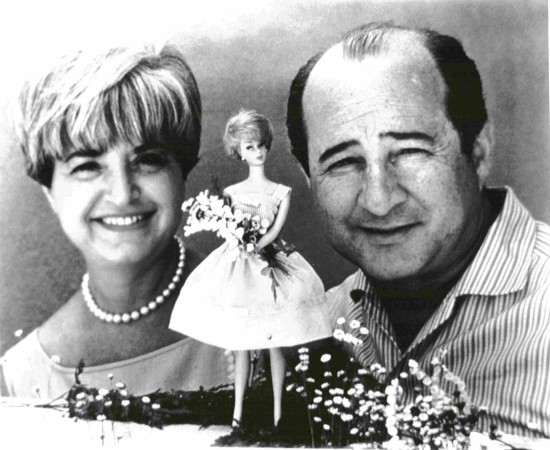The ancestor of Barbie dolls, one of the most discussed toys in the world, is actually a German!
Here is his story: Ruth Handler, and Elliot Handler founded Mattel as Mattel Creations in January 1945 in a garage.

Ruth Handler and her husband, Elliot, founded the toy company Mattel, Inc. in 1945. Fourteen years later, Ruth would introduce the world to Barbie Millicent Roberts, better known as "Barbie," who would become every little girl's best friend. Here is the story of the emergence of the Barbie doll.
Inspired by her daughter playing with fake paper dolls, Handler realized that this doll could be an important step in allowing little girls in the market to imagine the future. Barbie's look is modeled after a doll named Bild Lilli, inspired by a German comic book character. Mattel bought the rights to Lilli and Handler created his own version.
First Barbie doll on display at the American Toy Fair in New York City
Barbie's official birthday is March 9, 1959 – the day she was officially introduced to the world. Handler always wanted Barbie to be the first doll to emulate the glamor of 1950s stars like Elizabeth Taylor and Marilyn Monroe. 300,000 Barbie dolls were sold in its first year. The first Barbie doll sold for $3.
Year of Ken
Barbie's boyfriend Ken Carson met the world in 1961, two years after Barbie. This new playmate is named after Ruth Handler's son: Ken.
In 1963, Barbie's best friend Midge Hadley was introduced. A year later, Barbie's first younger sister, Skipper Roberts, arrived.
In 1967, Supermodel Twiggy was the first celebrity to join the Barbie family. Cher, Audrey Hepburn, Diana Ross, and JK Rowling - to name a few - would join the ranks of celebrities who were later turned into Barbies.
In 2018, Mattel released a new collection of "Inspiring Women" featuring three groundbreaking, history-making women: Amelia Earhart, Frida Kahlo and Katherine Johnson. Earhart was the first woman to fly solo over the Atlantic Ocean. Kahlo was not only an inspiring and beloved painter, she was an activist who continues to influence women's movements today. Awarded the Presidential Medal of Freedom by President Barack Obama in 2015, Johnson was a physicist, space scientist, and mathematician at NASA's Langley Center. She made calculations for Alan Shepherd's first historic flight into space, John Glenn's groundbreaking orbit of the earth, and Apollo 11's lunar landing orbit.
Celebrating Barbie's 60th anniversary in 2019, Mattel has released a new Barbie body type with a smaller chest, less pronounced waist and more defined arms.
German origin of babies
The ancestor of Barbie dolls, one of the most discussed toys in the world, is actually a German! Here is his story:
In 1952, cartoonist Reinhard Beuthien, working for Bild newspaper, first created a cute baby character. Deciding to draw an attractive woman when his boss didn't like the character, Beuthien found 'Lilli'. Although the character named Lilli earned her own living as a secretary, she was a character who ran after old and rich men. Lilli, who was not afraid to talk about sexuality, wore a bikini instead of a swimsuit, even though it was forbidden, and had fun in nightclubs until the morning "to watch the sun rise".
The character was loved by Bild readers, and Lilli was released as a doll in 1955. Lilli dolls with red lipstick and nail polish were sold in bars and tobacco shops. Lilli, which was first produced for adults and addressed as the "sex doll" by the famous New Yorker magazine writer Ariel Levy and as a "sex toy" by Eve Ensler, the author of the vagina monologues game, soon started to attract the attention of children as well. Ruth Handler, one of the founders of Mattel, who came to Germany on holiday towards the end of the 1950s, realized the popularity of the doll and wanted to bring the product to the USA. On the way home, she bought 1 Lilli doll for her own daughter Barbara and 2 for Mattel. The doll, which Mattel worked on for a while, was released in 1959 as Barbie, inspired by the name of Handler's daughter, Barbara. Production of Lilli dolls was discontinued in 1964 when Mattel soon bought all rights to Lilli. The last Lilli cartoon was published in 1961.

